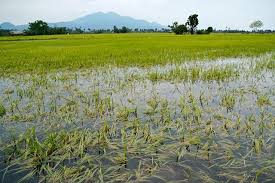Punjab: Floods submerge Amritsar fields, threaten basmati and paddy crops
The paddy and basmati rice, particularly from the Ajnala, Ramdas, and Chogawan blocks, renowned as ‘fragrant pearls’, are expected to suffer significant damage as more than 50% of agricultural fields across Amritsar have been submerged.
The sowing of fodder and vegetables is also likely to be delayed.
Chief agriculture officer Baljinder Singh Bhullar informed that out of approximately 1,41,000 acres of agricultural land, the preliminary survey suggested that nearly 71,000 acres were currently submerged.
He said a survey would be conducted to assess the exact extent of the damage once the water recedes. However, Bhullar warned that the basmati crop could suffer up to 100% loss if it remained under water for more than a week.
An agriculture official, speaking on condition of anonymity, said even a 25% loss in the basmati crop would significantly impact its aroma and cooking quality. As a result, the crop would fail to fetch its usual market price, in addition to a poor yield.
He further said floodwaters had entered as many as 35 villages in the Ajnala block, causing near-total destruction of the basmati crop in these areas.
Agriculture expert Jatinder Singh Gill informed that the impact of the floods extended beyond the loss of basmati and paddy crops. In areas affected by land erosion, it will be significantly more difficult for farmers to sow subsequent crops such as fodder, toria, mustard, and wheat, which is typically sown in October, he said.
“Potato and pea sowing usually begins around Sept 20. However, given the current flood situation, it is unlikely that farmers will be able to begin sowing on time. The water is yet to recede, and even after it does, fields must be ploughed and prepared,” Gill explained.
Notably, vegetables are cultivated on nearly 50,000 to 55,000 acres of land in the Majitha, Jandiala, and Verka blocks of Amritsar.
This article has been republished from The Times of India.

